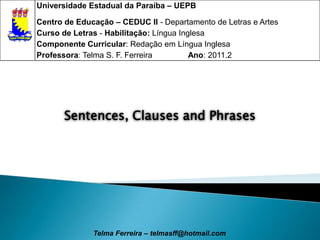
Phrase
- 1. Sentences, ClausesandPhrases Telma Ferreira – telmasff@hotmail.com
- 3. What Makes a Sentence? John explainedthe grammar. Subject = noun or pronoun that does an action or experiences a state of being Verb = expresses the action or “state”of the subject Object = noun or pronoun that receives the action of the verb
- 4. This is also a sentence … The students wereinterested. Subject Verb Complement A complement is a great deal like an object, but it differs in that it does not “receive” the action of a verb. Instead it “is” the subject. Complements can be nouns or adjectives. The key to understand them is to identify the verbs that they follow.
- 5. And this is a sentence as well. John wasin theclassroom. Subject = noun or pronoun that does an action or experiences a state of being Verb = expresses the action or “state”of the subject Adverbial = adverb or group of words that tells where, when, why or how the verb happened.
- 6. More adverbial examples John was a student last year. When John went to New Yorkto visit his aunt. Why Where John reads English texts quickly. How
- 7. Sentence components So, we can symbolize the basic components of a sentence in the following way: S + V / O / C / A Where: S = subject (a noun or pronoun that does an action) V = verb (the action itself) / = “optional” some verbs do not need an O, C or A O = object (a noun or pronoun that receives an action) C = complement (an adjective or noun that is the subject) A = adverbial (an adverbial that tells more about the action) Is this a sentence? The students were interested while John explained the grammar.
- 8. Verb Subject John spoke English while heexplained the grammar Object We have the original subject Johnwith its verb spokeand its object English But the sentence continues with a second subject, this time he, a second verb, explainedand a second object, the grammar.
- 9. Clause Our one sentence is basically two “mini” sentences hooked together by the word while. John spoke English while heexplained the grammar “Mini” sentences, units ofS+V/O,C,A, within a sentence are called clauses.
- 10. Clause 1 21 John spoke English while he explained the grammar. Afterstudying, John spokeEnglishwhileheexplainedthegrammar. In addition to the two clauses we are familiar with, this sentence has the added words after studying.These work together to give extra information about the clauses, but they do not form a clause. They form a phrase.
- 11. Phrase One way to define a phrase is to say it is a group of words that “belong together” in terms of meaning but donot have both a subject and a verb. PhraseS + V Another way to define a phrase is to think of how it works within a sentence. When you think of a phrase this way, you can define it as: Phrase = a group of words that acts like one word
- 14. Adjective phrase with an adjective as head (easiest part)
- 16. Summarizing My Word Myteacher Phrase Myfriendtaught us grammar Clause Myteachertaught us grammar becauseweneeded to improveourEnglish. Sentence
- 17. Exercise Identifythephrases, clausesandsentencesbellow. 1. Across the Universe 2. I Feel Fine 3. SheLovesYou 4. In My Life 5. While My Guitar Gently Weeps 6. I Want to Hold Your Hand 7. A Hard Day’s Night 8. Till There Was You 9. I Saw Her Standing There 10. All My Loving 11. When I Get Home 12. Lonesome Tears in My Eyes 13. I Call Your Name 14. When I’m Sixty-four 15. The Long and Winding Road 1. phrase 2. sentence/main clause 3. sentence/mainclause 4. phrase 5. dependent clause 6. sentence/main clause 7. phrase 8. dependent clause 9. sentence/main clause 10. phrase 11. dependent clause 12. phrase 13. sentence/main clause 14. dependent clause 15. phrase
